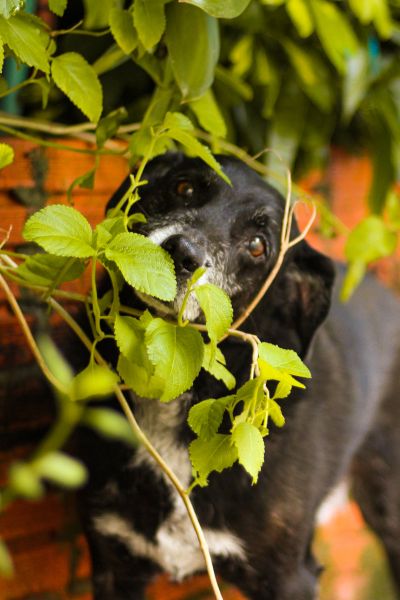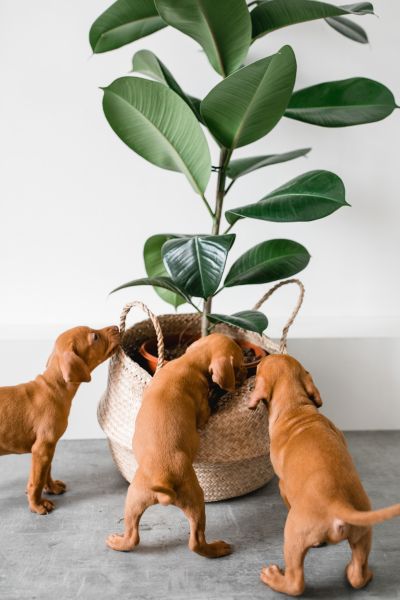Are you a dog parent interested in growing plants at home? Or are you simply curious about the flowers, shrubs, and trees you come across with your pooch during walks? Whether you’re a botany novice or an indoor houseplant expert, you can keep your canine pet protected by familiarizing yourself with the types of plants found in your area. This way, you can quickly determine if they’re toxic or non-toxic for your beloved pooch.
Waldo’s Friends makes it easy for you to determine which is which by sharing this list of most searched toxic and non-toxic plants. Review them below, find a particular genus or species, and click on its link to learn more. This post discusses:
Please remember that the information presented in this blog post is only meant to serve as a guide. It should not replace a consultation with your veterinarian. Always speak with your doctor to discover the risks of bringing home a certain plant.
Toxic plants for dogs:
Your dog’s reaction to a plant may be mild to severe depending on multiple factors. The biggest component would be the plant in question’s natural toxins. Some only cause mild irritation to your dog’s skin and gastrointestinal system, while others may cause shock or convulsions that require immediate medical assistance. Aside from the toxins, your dog’s size/age, how much of the plant he bit/ate, and his preexisting health conditions should also be considered. The following plants are toxic to dogs:
- Agave plants [genus]
- Aloe plants [genus]
- Avocado plants (similarly, dogs shouldn’t eat its fruits and hard pit)
- Chili plants
- Citronella plants
- Coleus plants
- Corn plants (different from edible corn, which can be consumed if the kernels are plainly cooked)
- Croton plants
- Dieffenbachia plants [genus]
- Dracaena plants [genus]
- Ficus plants [genus]
- Fiddle leaf plants
- Hosta plants [genus]
- Jade plants
- Jalapeño plants (similarly, dogs should not consume its spicy fruits)
- Lavender plants [genus]
- Mass cane plants
- Monstera plants [genus]
- Peace lily plants [genus]
- Philodendron plants [genus]
- Potato plants (dogs can occasionally eat only ripe and plainly cooked potatoes)
- Pothos plants [genus]
- Rubber plants
- Schefflera plants [genus]
- Shamrock plants
- Snake plants
- Tomato plants (however, dogs can consume its ripe fruits in plainly cooked form)
- Wandering Jew plants
- Yucca plants
- ZZ plants

Non-toxic plants for dogs:
The following plants do not contain any poisonous substances in any of its parts, from its leaves down to its roots. Nevertheless, remember that they should not be eaten by your dog in large quantities as they may cause indigestion as well as airway and/or intestinal obstruction. This can happen when he accidentally eats the tough parts, or if he doesn’t chew the plant matter properly. Some fruit-bearing plants may also be toxic in raw form, so it’s best to take note of these:
- Air plants
- Banana plants (dogs can eat peeled banana fruits in moderation)
- Basil plants (similarly, dogs can consume the plain herb in fresh or dry forms)
- Blackberry plants
- Blueberry plants (your dog can enjoy eating limited amounts of fresh blueberries)
- Calathea plants [genus]
- China doll plants
- Cucumber plants (its vegetables are edible for dogs)
- Garden pea plants
- Green bean plants (snap peas is one example of dog-friendly green beans)
- Nerve plants
- Peppermint plants
- Pilea plants [genus]
- Pineapple plants (the fruit is safe for dogs to eat as long as the spiky exterior and hard core are removed)
- Polka dot plants
- Prayer plants
- Pumpkin plants
- Raspberry plants (this is another type of berry that dogs can eat occasionally)
- Rosemary plants
- Sage plants
- Shrimp plants
- Spider plants
- Squash plants (its plainly cooked, chopped fruit can be served to dogs)
- Strawberry plants (dogs can eat its fresh fruits)
- Sunflower plants
- Zebra plants
- Zinnia plants
- Zucchini plants (you can offer the plainly cooked fruits for your dog to eat)
Other plant considerations:
General terms such as succulent plants, tropical plants, garden plants, and mosquito plants may include plants from varying families, genuses, and regions. Garden plants can include ornamental shrubs as well as fruit- and flower-bearing species. Mosquito plants, on the other hand, are defined as foliage with the natural ability to repel insects. The tannic acid and essential oils from some of these mosquito plants can cause dog ailments such as skin irritation and upset stomach. However, there are also dog-friendly options you can choose from.
In addition, it’s important to note that some plant names are used by multiple species. These include:
- Bamboo plants (true bamboo species are non-toxic, but lucky bamboo plants are toxic for dogs)
- Fern plants (true fern varieties are canine-friendly)
- Ivy plants (poisonous ivy plants include Hedera and Pothos)
- Money plants (Pachira aquatica or money tree is safe for pets)
- Umbrella plants (there are six unrelated plant species with this name)
In some cases, not all plants belonging to the same family are non-toxic or toxic. If you’re unsure about a certain plant, play it safe by finding its scientific name and searching for possible toxins it may contain. Take note of:
- Mint plants [genus] (dogs can only eat some species, but others are extremely poisonous)
- Pepper plants (toxicity is dependent on factors such as spice level)
- Wallflower plants [genus] (some plants are said to contain cheirotoxin, which are harmful cardiac glycosides)

Additional reminders:
If you’re caring for rambunctious puppies, be careful about giving them access to your backyard or leaving them around potted plants. Though non-toxic plants should not poison your pooch, there may be hard or sharp parts that could hurt him. These may cause physical injury if he brushes against the thorns (skin abrasions or cuts) or tries to bite into the tough branch (dental and jaw problems).
Aside from this, always choose canine-friendly substances to help your plant grow. Don’t spray pesticides or add fertilisers that your dog may accidentally dig, lick, or eat. If you suspect your dog that was exposed to poisonous insecticides, PetMD advises you to observe him for these symptoms:
- Excessive drooling
- Skin, eye, or mucous membrane irritation
- Vomiting
- Diarrhea
- Stomach cramps or pain
- Incontinence
- Weakness or incoordination
- Collapse
- Difficulty in breathing
- Muscle spasms or tremors
- Seizures
Exposure to fertilisers may also cause similar symptoms. Furthermore, they can lead to additional ailments such as burns on the pads of your dog’s feet and skin redness or ulcerations. Contact your veterinarian immediately and don’t wait for his symptoms to worsen. Try to find out how much he consumed and the ingredients of the product.
If you notice that your dog has been munching on an unusual amount of plant leaves, speak with your vet. There may be an underlying reason why your dog does it, and not just because he likes its taste. From lack of fibre and nutrients to feeling nauseous or gassy, it is best to address the heart of the problem instead of letting your dog get used to snacking on random plants.
Create a dog-safe sensory garden in your own backyard. Read this blog post to find out everything you need to help turn it into a mentally stimulating area for your four-legged best friend.
Leave a comment
Your email address will not be published. All fields are required.